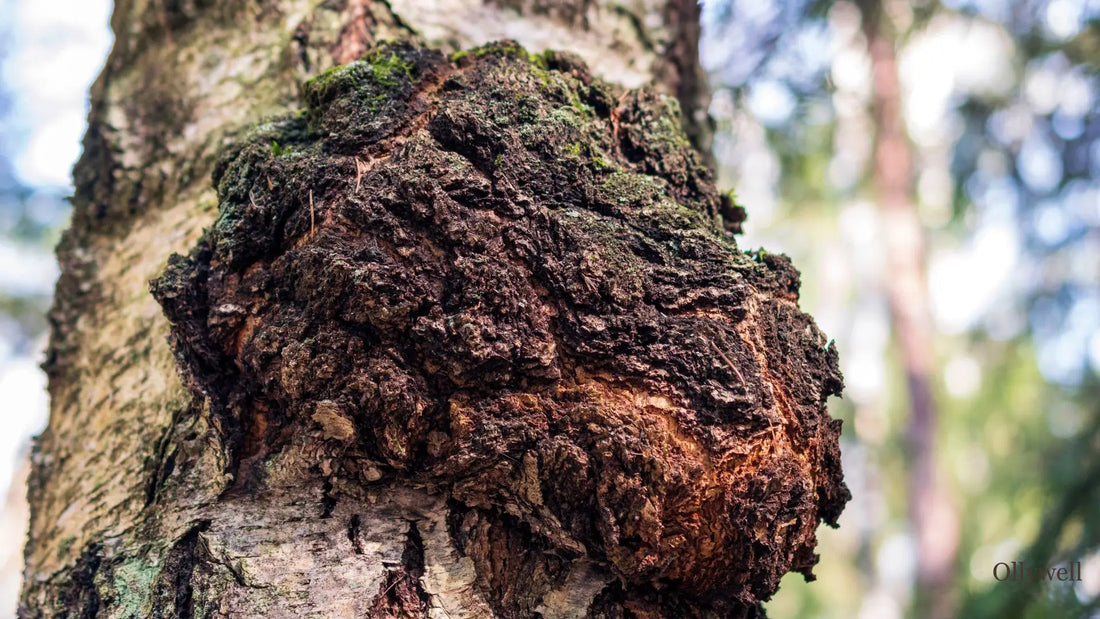Although Chaga (Inonotus obliquus) has been known for centuries in folk medicine, its use in modern phytotherapy must be based on reliable scientific evidence. So what do we really know today about its effects? Here's a summary of the key findings from a 2021 review by Szychowski at Journal of Traditional and Complementary Medicine.
Tradition vs. science – why study Chaga?
Chaga has long been used in Russia, China, and Korea as a remedy to support health and vitality. In the 21st century, however, its applications must be verified in accordance with evidence-based medicine (EBM). In an article published in the Journal of Traditional and Complementary Medicine, researchers analyzed data from both in vitro and in vivo studies to assess whether Chaga’s properties are scientifically justified.
A wealth of active compounds – what does Inonotus obliquus contain?
The publication emphasized that Chaga’s biological activity is primarily due to the presence of:
- β-glucans – immunoactive polysaccharides,
- Triterpenes and terpenoid derivatives,
- Phenols and melanins – powerful antioxidants,
- Sterols and ergosterol – with anti-inflammatory and hormonal activity,
- Enzymes (e.g., superoxide dismutase – SOD), which neutralize free radicals.
The authors noted that the effectiveness of these compounds depends heavily on the extraction method used – significant differences were found between water, alcohol, and ultrasound-based extracts.
Read also: Mistakes in taking functional mushrooms – how to avoid them
Anticancer effects – what do in vitro and in vivo studies show?
According to Szychowski and colleagues, Chaga has demonstrated the ability to inhibit the growth of various cancer cell lines, including lung, liver, colon, breast, ovarian cancers, and gliomas. The mechanisms of action include:
- Induction of apoptosis – programmed cell death in cancer cells,
- Inhibition of cell migration and invasion,
- Increased oxidative stress in cancer cells – by selectively raising ROS levels.
Particularly promising were results involving Chaga combined with delivery systems such as nanoparticles, which enhanced the cytotoxic effect against cancer cells.
Immunomodulation and anti-inflammatory activity – adaptogenic properties
The review also highlighted Chaga’s important impact on the immune system. Observed effects included:
- Reduction of pro-inflammatory cytokines (IL-6, IL-1β, TNF-α),
- Enhanced activity of macrophages and NK cells,
- Influence on NF-κB and MAPK signaling pathways, both of which are key in inflammatory and autoimmune processes.
In animal models, this birch parasite showed protective effects in the course of inflammatory bowel disease.
Chaga’s impact on glucose-lipid metabolism and type 2 diabetes
Animal studies (including in diabetic rat models) reported:
- Improvement in insulin resistance via PPARγ receptor activation,
- Decreased blood glucose and triglyceride levels,
- Support for regeneration of pancreatic islet β-cells.
These findings suggest Chaga may be a promising candidate for clinical research as a metabolic support agent, especially in prediabetic and insulin-resistant conditions.
Conclusions – what does science currently say about Chaga?
The authors concluded that Chaga exhibits a broad spectrum of biological activity. Although most studies have been conducted on cell cultures and animals, the collected data provide a strong foundation for:
- Recognizing Chaga as a potential functional food,
- Initiating clinical trials in accordance with EBM principles.
Controlled human studies are still needed, but the current experimental data are extensive and promising.
Read also: Ollywell - quality that you can trust
Scientific source:
Szychowski K.A., Foks H., Szechyńska-Hebda M., Szychowski K. (2021).
Inonotus obliquus – from folk medicine to clinical use.
Journal of Traditional and Complementary Medicine, 11(3), 293–302.











